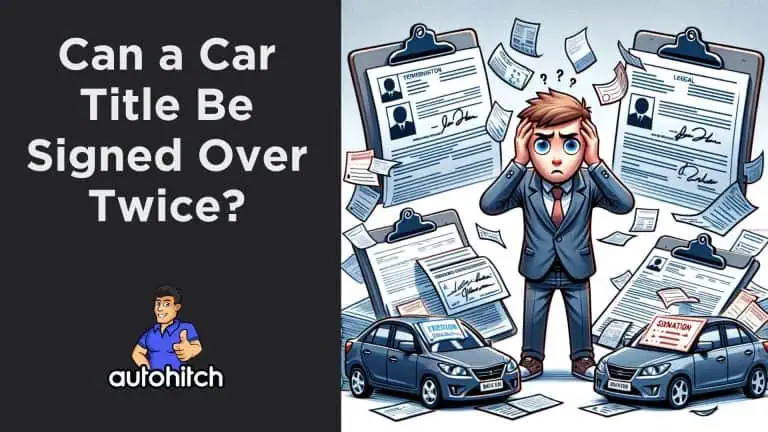A car title legally can only have one owner at a time. So once a seller signs over the title to the buyer, they no longer have ownership and cannot sign it over again.
However, there are some nuances around title transfers that cause confusion.
This article covers whether a title can be signed over twice, the proper title transfer process, how to fix issues, and the consequences of double transfers.
Related Articles To Read:
- Can You Add Someone To A Car Title?
- How to Fix Written Mistake On Car Title When Selling
- How To Sign Over A Car Title
- What Is Title Jumping and How to Avoid It?
- Two Names On Car Title How To Remove One
Table of Contents
When is a Title Transfer Needed?
You must sign over your car’s title when selling or gifting your vehicle to transfer ownership.
This signed title allows the new owner to register the car in their name. It contains key details like VIN, mileage, make/model, and the legal owner’s name.
Titles with active loans list the lienholder, requiring the loan be paid off first before selling.
So, in short, any transfer, sale, gift, or inheritance of a vehicle requires signing over the title to the new legal owner.
Is It Legal for a Title To Be Signed Over Twice?
No, once a title is signed over from the original seller to a buyer, that seller has released ownership and generally cannot sign the title over again legally.
However, if the new buyer never registers that title under their name at the DMV before reselling, it allows the potential for the original seller’s signature to still be valid if they kept a copy.
- This invalid double transfer by skipping registration is called “title jumping” and is illegal in most states.
- It can occur intentionally for fraudulent sales, accidentally, or innocently between private parties.
While signing over a title twice is physically possible, doing so wrongly can lead to significant legal and financial issues.
Proper Process to Transfer a Signed Title
The correct process for vehicle title transfers between buyers involves three major steps:
- Seller signs over title – Seller fills out title transfer info and signs it in ink
- Buyer registers title – Buyer presents signed title at DMV to register in their name
- Buyer can resell – After registration, the new owner listed can legally sign over and transfer title to the next buyer
This establishes a clear title history. Problems arise when buyers skip Step 2 before attempting any resale. Overall, it is best practice to only sign over a title once the prior transfer is complete.
Key Takeaways: Title Transfers
- Seller must sign over the title for any transfer of vehicle ownership
- Buyer should immediately register signed title to complete the prior transfer
- Only once registered under the buyer’s name can they legally resell the vehicle
How Do I Correct an Issue with a Double Signed Title?
If you discover a title was assigned over twice, either as a buyer or seller involved, prompt action is recommended to resolve ownership and minimize liability. Here are the main options:
- Contact your DMV – Alert them of the issue and they can advise on the next steps
- Obtain duplicate title – Possessory owner applies for duplicate from DMV with fees
- Involve relevant parties – Having the original seller and subsequent owners coordinate can help
- Consult an attorney – They can review evidence of ownership and represent your interests
It also helps greatly to gather paper evidence early on regarding your purchase, including any bill of sale, registration docs, inspection reports, etc. Note that usage of white-out or altering titles is illegal – all corrections must go through proper DMV channels.
What Are Risks If I Have an Open Title Signed Multiple Times?
While definitions vary by state, an open title, meaning not properly signed over and registered under each subsequent buyer, can expose parties to major headaches:
- Legal ownership disputes – Two owners both claiming rightful ownership of the same vehicle
- Financial penalties for violations if illegal activity is found
- Tickets & violations tied to you – Previous owners are held liable if new buyers break laws
- Insurance issues if an accident occurs under a non-registered owner
At a minimum, an open title causes significant registration delays and requires extra DMV paperwork to fix. At worst, it leads to lawsuits, fines, and criminal charges.
Frequently Asked Questions
Below are additional common questions about titles potentially showing two owners:
What if my relative passed away after partly signing over title?
A beneficiary would need to apply for a legally equivalent court-ordered title with the DMV by presenting the will or estate documentation.
Are there any valid reasons a title could be signed over twice?
Rarely – if an error was made on the first title transfer, corrections might require a duplicate title to be signed again. But this should involve the DMV to be legally valid.
Can title issues impact insurance or registration status?
Yes – insurance companies and the DMV check closely for ownership gaps, unclear titles, or open liens. It can lead to revoked registration or denied insurance claims.
My Final Thoughts
In summary, formally, a car title can only have one legal owner at a time.
Yet confusing situations around partial transfers or title jumping can physically result in multiple signatures. If selling or inheriting a vehicle, it is critical that you follow your state’s guidance for title transfers carefully to avoid ownership issues down the road.



